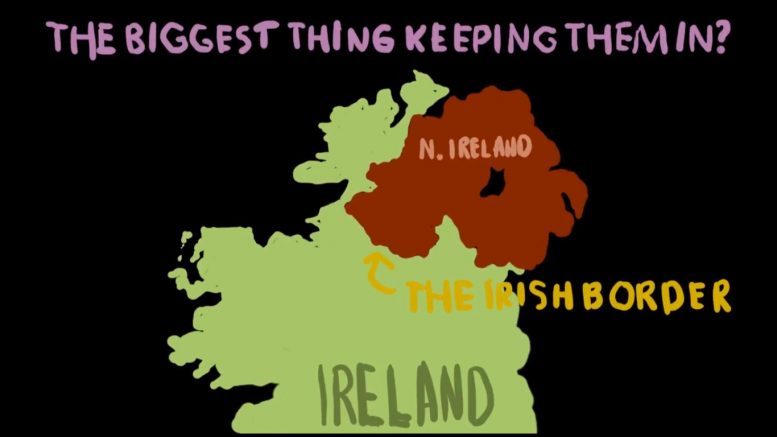Nigel Farage, the face of Euroscepticism, told Leading Britain’s Conversation (LBC) that the Irish border issue was “the greatest hoax in modern history”. This 499km ‘hoax’ has been a thorn in every Brexiteer’s side for almost 900 days now. But did anyone know about it when they voted? Do they know about it now?
Voice of London took to the streets of London to ask people what they knew about the Irish border, and what they thought of Brexit:
https://www.youtube.com/watch?v=2we8REeR_tA&feature=youtu.be
Brexit negotiations are at a ‘critical point’ according to Prime Minister Theresa May ahead of an EU summit in Brussels this week and together with the EU, the UK said that they would consider technological solutions to replace a border backstop.
Quizzed HMRC leadership today @CommonsTreasury. They were clear:
– no need for any infrastructure whatever at Irish border in any scenario
– no instructions to introduce it
– any new arrangements can be ready in 24 months from point of clarity
So why do we need the #backstop?— Simon Clarke MP (@SimonClarkeMP) November 21, 2018
The main hurdle Britain has had to try and jump is the contentious issue of the invisible border between the Republic of Ireland and Northern Ireland. The border was first formed in 1921 as part of the Anglo-Irish Treaty, and it caused the Irish Civil War 1922-1923 which ultimately led to the division of the country and the onset of the Troubles.
A hard border has been widely warned against, including by the previous prime minister Tony Blair, so this would mean the UK staying in the customs union but there is a big push for a hard Brexit, which means completely leaving the EU and everything it brings with it i.e. the customs union.
There’s me at the Brexit negotiations. pic.twitter.com/sVuFOahZ3o
— The Irish Border (@BorderIrish) February 8, 2018
Tensions around the border have never gone away, with the IRA and the UVF becoming more and more detached from the issues and the people they were originally fighting for. Families have been torn apart and the communities around the border are still trying to move on and rebuild from the Troubles.
In Theresa May’s only speech during the EU referendum campaign, she mentioned Ireland just once, telling the Institute of Mechanical Engineers in central London: “We export more to Ireland than we do to China”. The neglect of the north of Ireland by the British government is nothing new. Ahead of the referendum. Boris Johnson told the BBC that Brexit would not affect the Irish border. The majority of stories up to and during the Brexit campaign about Northern Ireland were weapons aimed at Jeremy Corbyn. The country is being neglected and with a devolved government, the region is isolated and vulnerable.
According to a recent study by the Northern Ireland Statistic and Research Agency, ‘more people in Northern Ireland have died by taking their own lives since the signing of the agreement than from violence during the Troubles’. A report by the Samaritans found that the suicide rate in the UK increased by 3.8 per cent since 2014, but during the same period it increased by 18.5 per cent in Northern Ireland. Siobhan O’Neill- a professor of Mental Health Sciences at Ulster University- produced a study which found the most significant cause of the mental health issues in the north was PTSD from the Troubles.
In January Jeremy Hunt introduced £25 million of additional funding to tackle suicide rates in England but nothing for Northern Ireland. More examples of Northern Ireland being left behind, are abortion rights and same-sex marriage both are legal in England but crimes in the north.
Channel 4 took to the British people to ask them what they knew about the Irish border, armed with a map and a marker they were tasked with drawing the Irish border. One person said “As a younger generation, we don’t know too much about it. We don’t learn this kind of thing. It’s not something that is taught to be honest. ”
In comparison to England, the majority of Northern Ireland voted to remain in the EU, they were aware of what a hard Brexit meant. Did the majority who voted to leave in England know the same? With this year being the 20 year anniversary of the Good Friday Agreement, it was hard for the people of Northern Ireland to ignore all the suffering that surrounds the border.
The gulf between the two islands is growing farther apart, and now with the DUP acting on their own wishes and not the needs of their people, Northern Ireland and the Irish border will remain a dividing issue until the English government and the rest of the UK learn to look across the Irish sea, listen and learn.
Words: Sorcha Gilheany Animation & video: Sorcha Gilheany & Méabh Gilheany
Subbing: Fiona Patterson

